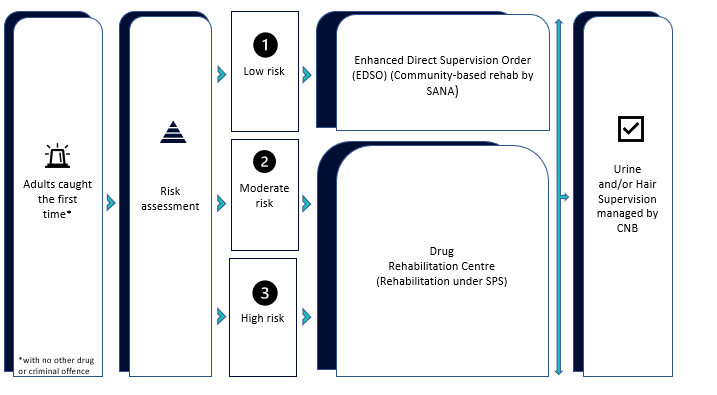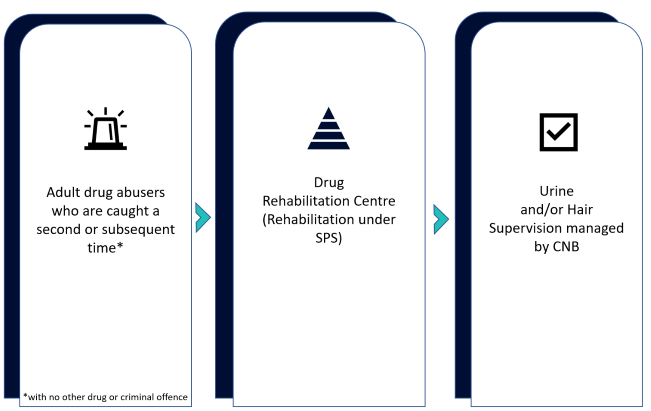CNB Explains
Get your questions about CNB answered with CNB Explains.
To help drug abusers successfully reintegrate into society and help reduce recidivism, differentiated pathways of rehabilitation and treatment were introduced. Abusers caught purely for consumption offences are usually sent for treatment and rehabilitation instead of being charged in Court. Therefore, these abusers who are sent to DRC for treatment and rehabilitation will not hold a criminal record for their drug abuse offence. On the other hand, drug abusers who are under investigation for other drug or criminal offences will be charged in court under the Misuse of Drugs Act 1973.
Drug abusers could be placed directly on the Drug Supervision Scheme or admitted to the Drug Rehabilitation Centre (DRC) for treatment and rehabilitation. They are introduced to evidence-based treatment and rehabilitation plans that provide them with the skills to build a drug-free life. CNB and Singapore Prison Service (SPS) work closely to provide this support system.
The pathways of recovery depend on the abusers’ assessed risk of reoffending. Find out more on the pathways of recovery below.

Diagram 1: Rehabilitation and supervision for adults caught for the first time, purely for drug consumption offences
Drug abusers who reoffend will be sent to the DRC.

Diagram 2: Rehabilitation and supervision for adults caught multiple times for drug consumption offences
Enhanced Direct Supervision Order (EDSO) for first-time, low-risk adult abusers.
Drug abusers who are caught for the first time and are assessed to have low risk of reoffending may be served with an Enhanced Direct Supervision Order (EDSO). The EDSO was introduced in 2019 as part of Misuse of Drugs Act amendments, to help and strengthen
the reintegration of abusers into society.
Supervisees under the EDSO do not go to the DRC. They will be assigned a community case manager by SANA to support them and their family in their rehabilitation. They are allowed to stay at their place of residence during the period of supervision but
will be required to attend compulsory counselling sessions and undergo urine tests. The counselling sessions involve psychology-based methods such as goal-setting and family engagement. Supervisees are assessed regularly during their rehabilitation
journey and the interventions are adjusted accordingly based on their progress.
Drug Rehabilitation Centre for repeat and or higher-risk abusers.
Drug abusers with moderate or higher risk of relapse or who are repeat abusers will undergo rehabilitation at the DRC. To help abusers to rehabilitate and reintegrate into society, abusers who successfully complete their DRC regime will not have a criminal
record.
This applies only if they are not under investigation for any other drug or criminal offence for which they may be charged in court. In such an instance, the abuser may also be charged in court for drug consumption and if found guilty, will have a criminal
record.
In the DRC, they receive intensive rehabilitation carried out by Singapore Prison Service (SPS) where the type of programme, intensity and duration of rehabilitation varies according to individuals’ rehabilitation needs. This includes psychological-based
intervention programmes that target drug use habits, family programmes that equip inmates with relationships skills, as well as vocational and employability skills training to support ex-abusers in their reintegration into society.
The DRC separates abusers by risk of reoffending and treatment and rehabilitation would be for 12 months or more. In 2019, in order to help pure drug abusers to reintegrate back into society, the rehabilitation regime was enhanced and extended
to repeat pure drug abusers who were third-timers and above. More on the DRC regime can be found here.
Post-release, abusers undergo urine and/or hair supervision to detect and deter relapse.
Staying drug-free can be tough and supervision can help keep drug abusers from a relapse.
All drug abusers caught after 1 August 2019 for drug consumption are issued Supervision Orders and placed on the Drug Supervision Scheme for five years.
As a supervisee, they undergo regular mandatory urine tests. Such regular checks help deter drug relapse and allow for early intervention if they do relapse. Supervisees who do well on supervision may be allowed to do hair analysis tests which offer longer
periods in between checks; however, this privilege may be withdrawn should supervisees fail to observe the terms of the supervision order.
The 5-year supervision order is to help abusers kick the drug habit and develop a drug-free lifestyle.
As elaborated above, first-time adult abusers assessed to have low risk of offending can be emplaced directly on supervision through EDSO while others are sent to the DRC prior to serving their Supervision Order. Eligible supervisees also go through Community
Supervision Sessions conducted by CNB officers. Since 2019, CNB officers have started to be trained in Community Supervision Skills (CoSS) needed to effectively engage supervisees. Find out more about Community Supervision Sessions by CNB here.
) or https:// as an added precaution. Share sensitive information only on official, secure websites.
.jpg?sfvrsn=dba36539_0)

